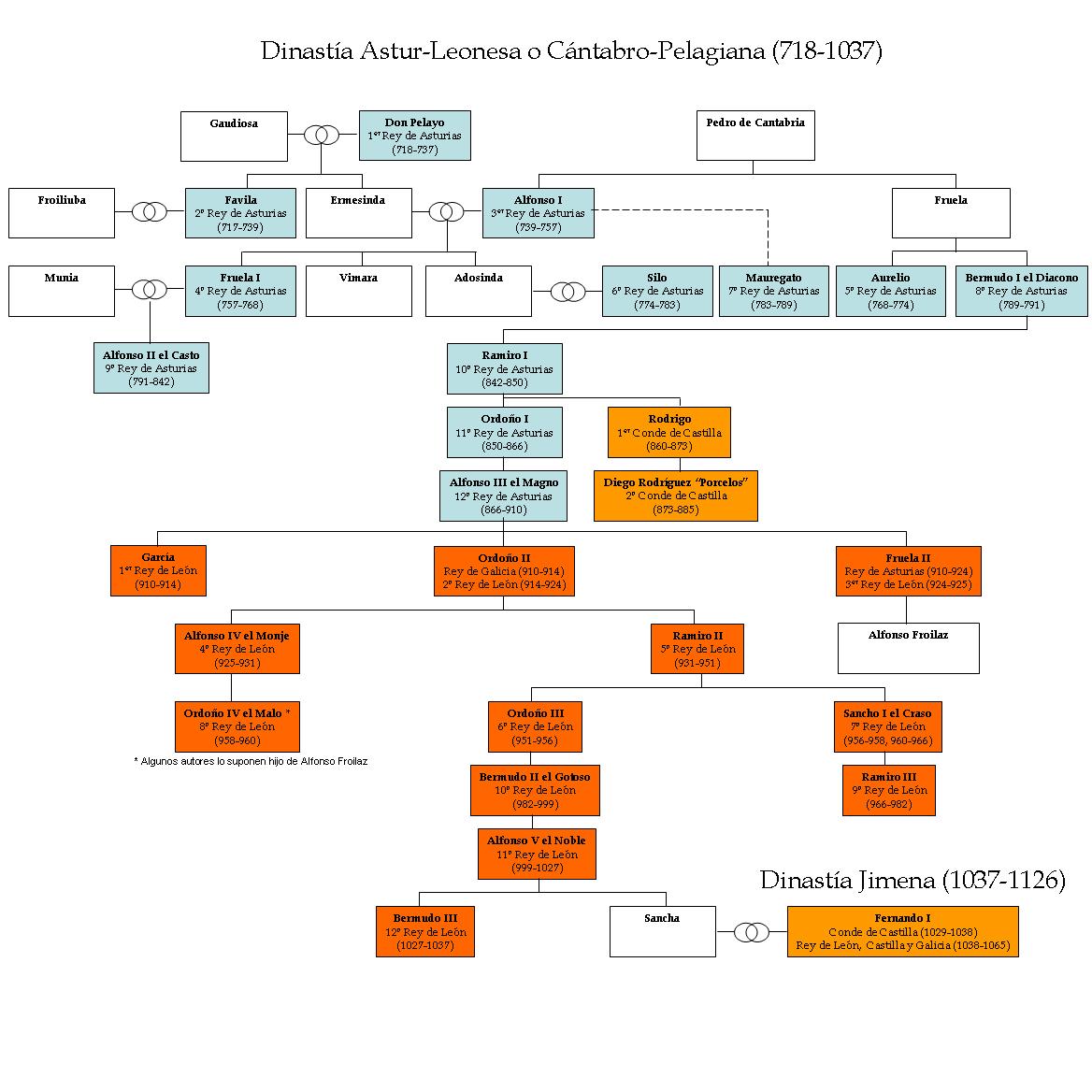Kings of Asturias on:
[Wikipedia]
[Google]
[Amazon]
This is a list of the rulers of the
ImageSize = width:600 height:550 #Tamaño de la imagen: ancho, alto
PlotArea = width:50 height:530 left:50 bottom:10 #Tamaño de la gráfica en sí dentro de la imagen: ancho, alto, margen izquierdo, margen derecho
DateFormat = yyyy #Formato de fechas= y-cifra de año, m-cifra de mes, d-cifra de día.
Period = from:718 till:927 #Período de tiempo representado: desde, hasta
TimeAxis = orientation:vertical #Orientación del eje de tiempos: horizontal o vertical
ScaleMajor = unit:year increment:10 start:718 #Escala
Define $dx = 20 # shift text to right side of bar
PlotData=
bar:Kings color:blue width:25 mark:(line,white) align:left fontsize:M
from:718 till:737 shift:($dx,0) text:

Kingdom of Asturias
The Kingdom of Asturias ( la, Asturum Regnum; ast, Reinu d'Asturies) was a kingdom in the Iberian Peninsula founded by the Visigothic nobleman Pelagius. It was the first Christian political entity established after the Umayyad conquest of V ...
, a kingdom in the Iberian peninsula
The Iberian Peninsula (),
**
* Aragonese and Occitan: ''Peninsula Iberica''
**
**
* french: Péninsule Ibérique
* mwl, Península Eibérica
* eu, Iberiar penintsula also known as Iberia, is a peninsula in southwestern Europe, defi ...
during the Early Middle Ages
The Early Middle Ages (or early medieval period), sometimes controversially referred to as the Dark Ages, is typically regarded by historians as lasting from the late 5th or early 6th century to the 10th century. They marked the start of the Mi ...
. It originated as a refuge for Visigothic
The Visigoths (; la, Visigothi, Wisigothi, Vesi, Visi, Wesi, Wisi) were an early Germanic people who, along with the Ostrogoths, constituted the two major political entities of the Goths within the Roman Empire in late antiquity, or what is kno ...
nobles following the conquest of Iberia by the Umayyad Caliphate
The Umayyad Caliphate (661–750 CE; , ; ar, ٱلْخِلَافَة ٱلْأُمَوِيَّة, al-Khilāfah al-ʾUmawīyah) was the second of the four major caliphates established after the death of Muhammad. The caliphate was ruled by th ...
. Following the forced abdication of Alfonso III by his sons in 910, the kingdom was split into three: Asturias
Asturias (, ; ast, Asturies ), officially the Principality of Asturias ( es, Principado de Asturias; ast, Principáu d'Asturies; Galician-Asturian: ''Principao d'Asturias''), is an autonomous communities of Spain, autonomous community in nor ...
, León, and Galicia. All three were reunited in 924 under the Kingdom of León.
For later kings, see the list of Leonese monarchs
In the reign of Ordoño I of Asturias (850–866), the kingdom began to be known as that of León. In 910, an independent Kingdom of León was founded when the king of Asturias divided his territory amongst his three sons.
Below follows a l ...
and the list of Galician monarchs
Galicia is an autonomous community and historical nationality in modern-day northwestern Spain on the Iberian Peninsula, which was a major part of the Roman province known as Gallaecia prior to 409. It consists of the provinces of A Coruña, ...
. From 1388, the title Prince of Asturias
Prince or Princess of Asturias ( es, link=no, Príncipe/Princesa de Asturias; ast, Príncipe d'Asturies) is the main substantive title used by the heir apparent or heir presumptive to the monarchy of Spain, throne of Spain. According to the Sp ...
has been used for the heirs to the Castillian and Spanish
Spanish might refer to:
* Items from or related to Spain:
**Spaniards are a nation and ethnic group indigenous to Spain
**Spanish language, spoken in Spain and many Latin American countries
**Spanish cuisine
Other places
* Spanish, Ontario, Cana ...
thrones.
List
Timeline
Pelagius
Pelagius (; c. 354–418) was a British theologian known for promoting a system of doctrines (termed Pelagianism by his opponents) which emphasized human choice in salvation and denied original sin. Pelagius and his followers abhorred the moral s ...
from:737 till:739 shift:($dx,-6) text:Favila
Favila or Fafila (died 739) was the second King of Asturias from 737 until his death. He was the only son and successor of Pelagius, the first Asturian monarch.
In 737 he founded the Church of Santa Cruz, in his capital of Cangas de Onís, bu ...
from:739 till:757 shift:($dx,-5) text: Alfonso I
from:757 till:768 shift:($dx,-5) text: Fruela I
from:768 till:774 shift:($dx,-5) text: Aurelio
from:774 till:783 shift:($dx,-5) text:Silo
A silo (from the Greek σιρός – ''siros'', "pit for holding grain") is a structure for storing bulk materials. Silos are used in agriculture to store fermented feed known as silage, not to be confused with a grain bin, which is used t ...
from:783 till:789 shift:($dx,-7) text: Mauregato
from:789 till:791 shift:($dx,-5) text: Bermudo I
from:791 till:842 shift:($dx,-5) text: Alfonso II
from:842 till:850 shift:($dx,-5) text: Ramiro I
from:850 till:866 shift:($dx,-5) text: Ordoño I
from:866 till:910 shift:($dx,-5) text: Alfonso III
from:910 till:925 shift:($dx,-4) text:Fruela II
Fruela II (Froila II) (c. 875–July 925) was the King of Asturias from the death of his father, Alfonso III of Asturias, in 910 to his own death. When his father died, the kingdom was divided, with the third son, Fruela, taking the original porti ...
Family tree

See also
*Kingdom of Asturias
The Kingdom of Asturias ( la, Asturum Regnum; ast, Reinu d'Asturies) was a kingdom in the Iberian Peninsula founded by the Visigothic nobleman Pelagius. It was the first Christian political entity established after the Umayyad conquest of V ...
*Astur-Leonese dynasty
The Asturian or Astur-Leonese dynasty (Spanish ''dinastía asturiana'' or ''astur-leonesa''), known in Arabic as the Banī Adhfūnsh ("sons of Alfonso"), was the ruling family of the kingdom of Asturias and León from 739 until 1037. Under their r ...
{{DEFAULTSORT:Asturian monarchs
Lists of Spanish monarchs
Visigoths
Articles which contain graphical timelines